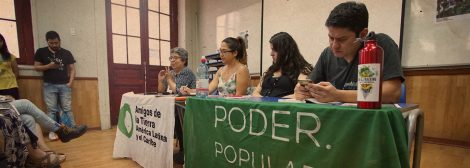“False solutions do not offer a way out of the crisis because they do not put life above everything else. The logic of life needs to be present in our political actions. And for this, system change is needed”, said feminist Natalia Lobo, from the World March of Women Brazil, during the Peoples´ Summit in Santiago, Chile.
The activist was one of several speakers at a workshop titled “The crisis as a business opportunity, market mechanisms, and the privatization of nature”, held at the University of Santiago de Chile, where the Summit is taking place.
The activity was organized by Friends of the Earth Latin America and the Caribbean [1] (ATALC) and co-organized by the Trade Union Confederation of the Americas [2] (TUCA), the World March of Women [3] (WMW), and the Transnational Institute [4] of The Netherlands (TNI). During the workshop ATALC, TUCA and the WMW made reference to the Continental Day in Defense of Democracy and Against Neoliberalism, highlighting the importance of this joint process of struggle, created in 2015. On Thursday, the Continental Day will carry out an activity at the Summit.
Environmental activist Leticia Paranhos, from ATALC, spoke at the workshop: “we need to go beyond the capital vs. labor conflict, as we are now dealing now with a capital vs. life conflict.” “For this system, there are lives that are disposable, there are lives that do not matter to capitalism”, she warned.
Meanwhile, activist Juan Pablo Soler, from the Latin American Movement of People Affected by Dams (MAR), also member of the Ríos Vivos Movement in Colombia, asked “why hydroelectric projects are not clean”. Answering himself, he explained: “because of the displacement of communities that they cause and the blood that they shed—such as in the case of Berta Cáceres and other members of the Civic Council of Popular and Indigenous Organizations of Honduras (COPINH) or the murders due to the Hidrosogamoso project in Colombia.”
Lyda Forero was representing TNI, which works with popular movements from Latin America and other parts of the world. On her turn to speak, she said that “the concept of ‘Just Transition’, built for decades by unions and popular organizations, is nowadays being co-opted by corporations who are falsely presenting dirty energy projects as transition projects.” “We need to build more radical proposals in our alliances about how this transition should be”, stressed Forero.
Also, Camila Montecinos, from the National Association of Rural and Indigenous Women of Chile (ANAMURI – CLOC Via Campesina), noted that “climate smart agriculture does not exist”. For her, it is “simply an advertisement tool” that allows corporations and Northern governments to avoid real solutions to climate change (such as radical emission reduction) while damaging peasant agriculture.
The representative of the Honduran Workers Union Confederation (CUTH), Fanny Erazo, spoke on the panel on behalf of TUCA. She considered that “the crises are strategies well-planned by US and European interests, which spark processes of militarization of territories”. “In Honduras they are killing our leaders. With militarization they aim to control our leadership and if they don’t succeed, they end up killing targeted people”, explained Fanny.
